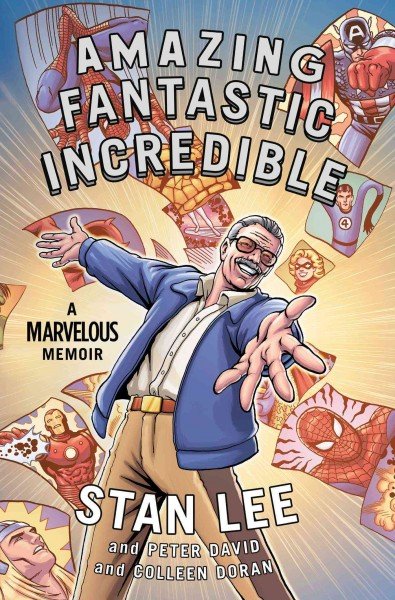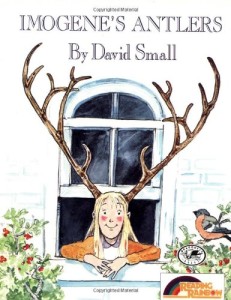(1) John Green of the Vlog Brothers waves Nalo Hopkinson’s Midnight Robber at the camera and heartily endorses it to 2.6 million subscribers at the 2:00 mark in his “Pizzamas Day 4” video posted November 12.
Today Hopkinson’s book – originally published in 2001 — ranks 2,902 in Amazon’s Kindle eBooks>Science Fiction & Fantasy > Fantasy > Paranormal & Urban category. I wish I knew where it was ranked the day before for the sake of comparison.
(2) NPR interviewed Stan Lee about his new autobiography.
The man who dreamed up lots of backstories for Marvel characters has now put out his own origin story: A memoir, Amazing Fantastic Incredible, in comic book form. It begins with Lee as a boy, transported to other worlds through books by Arthur Conan Doyle, H.G. Wells and William Shakespeare. His real world was the Depression, a father mostly out of work and a dingy New York apartment with laundry hanging in the kitchen and a brick wall for a view. Lee says his mother doted on him; he remembers she’d just watch him read. “One of the best gifts I ever got — she bought me a little stand that I could keep on the table while I was eating, and I could put a book in the stand, and I could read while I was eating. I mean, I always had to be reading something,” he recalls.
(3) Discovery Times Square is hosting “Star Wars And The Power Of Costume: The Exhibition” which includes costumes from the forthcoming movie.
Featuring 70 hand-crafted costumes from the first six blockbuster Star Wars films, this exhibition reveals the artists’ creative process—and uncovers the connection between character and costume. George Lucas imagined and created a fantastical world filled with dynamic characters who told the timeless story of the hero’s journey. The costumes shaped the identities of these now famous characters, from the menacing black mask of Darth Vader and the gilded suit of C-3PO, to the lavish royal gowns of Queen Amidala and a bikini worn by Princess Leia when enslaved by Jabba the Hutt. A special presentation for the showing at Discovery Times Square in New York will feature seven additional costumes from the highly anticipated film, Star Wars: The Force Awakens.
(4) James H. Burns denies that “love of the Three Stooges is a guy thing” at TV Party.
One night, in one of the popular Broadway joints, I’m having a couple of drinks with an actress I had recently met. A lovely, musicals-type gal….
And. somehow, I mention the Stooges. She tells me she LOVES the Stooges…
So, being a little devilish, as many of you know I can be, I say to her:
“Great…. What’s the only known defense for this…”
And I start doing a, slow-motion, split-finger, eyepoke. She INSTANTLY raises her hand, sideways, to her nose.
(5) Get the electronic Mythlore Plus Index for free – or at least that’s how it’s supposed to work. Order fulfillment goes through PayPal which won’t take a zero-price sale.
Available as a fully searchable digital file downloadable in PDF format, this newly, updated edition of the Mythlore Index covers issues 1-127 and has now been expanded to include all articles and reviews published in the Tolkien Journal, Mythcon Conference Proceedings, and Mythopoeic Press Essay Collections. Articles are indexed by author, title, and subject, and reviews by author and author of item reviewed. The index is illustrated with classic black and white artwork from early issues by Tim Kirk and Sarah Beach. This essential reference in mythopoeic studies will be updated after the publication of each Mythlore issue.
Add it to your cart and when you check out you’ll be sent a download link.
(6) Today In History
- November 16, 2001: First Harry Potter film opens
(7) Christopher M. Chupik, guided by his own reading experiences, says there is a tendency to shortchange the appeal of classic sf, in his guest post “Reflections of a Golden Age” on According To Hoyt.
My high-tech Kobo e-reader has a copy of Edmond Hamilton’s The Star Kings on it. Does it matter that I was reading this novel with a device more sophisticated than any of the computers contained within? Of course not.
One of the complaints made was that the younger generation can’t relate to “futures” where men still wear hats and they can make intelligent positronic robots but not personal computers. I say you’re not giving the younger generation enough credit. When I was reading Bradbury and Asimov, I was very aware that I was reading of future’s past. It doesn’t matter that Orwell’s 1984 is behind us (or is it?) any more than it matters that the Mars that Burroughs and Bradbury wrote about has no more foundation in reality than Middle-Earth.
It didn’t matter to me because I could see the things that hadn’t changed. Ultimately, the human experience remains consistent across the ages. Sure, superficial things like slang and fashions change with the decades…
Feel free to ignore the slur on this blog in the first paragraph; I did. (Almost.)
(8) Heritage Auctions is taking bids on a large selection of classic comics. At this writing, Superman #1 is going for $30,000.
(9) T. Campbell’s nominations for the“11 Weirdest Supergirl Stories” are posted on ScreenRant.
The Time She Was Superman’s Archenemy
No one seems to be quite sure where the Linda Danvers Supergirl is at this point (we last saw her in Hell, of all places), but not long after Supergirl‘s comic cancellation, a Supergirl from Krypton showed up (Superman/Batman #8, 2004) who was just straight-up the cousin of Superman. No angel powers, no shapeshifting, no unfortunate Luthor connections, no alternate-Earth shenanigans… just Kara Zor-El, the classic “Orginal Recipe” Supergirl from before things got messy. Except for the part where she might’ve been sent back to kill Superman.
(10) Lou Antonelli stopped doing the backstroke in the punchbowl long enough to post “You Heard It Here First” at This Way To Texas.
George R.R. Martin will be the next recipient of the Science Fiction Writers of America Grand Master Award (The Damon Knight Memorial Grand Master Award).
No, I do not have inside information, nor do I have a crystal ball. It’s simply a logical conclusion, especially if you know how the literary leaders of the science fiction community think.
Regardless of the merit of Martin’s literary output, he will get the award as a reward for helping trounce the dissident nominees for the Hugo awards this year (the so-called Sad Puppies). It’s not really any more complicated than that.
(11) In “A Forthcoming Speculative Fiction Anthology Asks Transgender Authors To Imagine New Worlds” at Bitch Media, Katherine Cross posed this question to Casey Plett and Cat Fitzpatrick.
On that note, what are your thoughts on the controversy around the Sad Puppies, the group who tried to rig the reader-voted Hugo Awards to favor “traditional” sci-fi works. It was clearly a powerful, angry, and organized reaction against the steady diversification of storytelling in sci-fi and spec-fic. What exactly is happening to this genre that’s so explosive and dangerous?
CP: White straight cis men are getting very upset because they feel they’re losing something when a more diverse set of stories is represented. On the one hand, they don’t have to worry—the share of representation of white straight cis male characters in sci-fi is maybe dropping from 98 percent to 95. But on the other hand, they’re right—they are losing some measure of dominance, and they should lose this. And I think acknowledging that challenges a fluffy teddy-bear idea of what an ally is—the idea that no one is going to lose anything. Being an ally requires giving shit up, which is what these people are not prepared to do.
CF: I think the throwing-the-toys-out-of-the-pram thing totally describes Brad Torgersen [sci-fi author and ringleader of the Sad Puppies]. I think Vox Day [another author, who organized an extreme offshoot of the Sad Puppies called the Rabid Puppies] is altogether a more sinister person, with really far-right politics and a desire to upset people to get attention. He’s a serious reactionary, traditionalist, religious, pseudofascist type—he even called leading spec-fic writer N.K. Jemisin an “uneducated half-savage” because she’s Black. And I think he saw Torgersen’s toy-throwing and said, “Here is a tool I can use to hurt people.”
I do fear that the way the story has been reported makes it seem as if spec-fic is going through growing pains that literary fiction outgrew long ago, as if lit-fic is more mature than spec-fic or sci-fi. Yet lit-fic has these same problems [with diversity and bigotry] and actually deals with them in a much less effective way. Part of it is that spec-fic is always concerned with community—you always have to invent the world from scratch, which entails obviously political choices. Traditional lit-fic straight white authors can say, “I’m just writing how the world is,” and even believe it, but if you’re a sci-fi writer who wants every book to be like Heinlein, you can’t escape the fact that you’re making this up, that your choice as a writer is meaningful and political.
CP: I think this stuff does get talked about in lit-fic—the VIDA Count revealed just how male the writing published by prestigious magazines was. That caused a big scandal. But it was still limited to writers. People in my mfa knew, but I think if you asked a person in a bookstore’s fiction section about the VIDA Count, they would have no idea what it was, whereas someone in the sci-fi section would probably know about Puppygate.
CF: Totally. On one hand, that relative openness laid them open to the whole Puppy thing, but on the other hand, it has meant much more engagement with the debate. And in the end the Puppies were voted down in the actual awards, even if that meant not awarding some categories. Which was kind of amazing. And it opened up a really important conversation and brought a lot of people together around it. I’m actually kind of happy about how the spec-fic or sci-fi community as a whole has handled this thing.
CP: I have a friend who said, “When stuff like this happens, it means you’re winning,” and I think they might be right in this case. It also opens up that question, “Who is focused on awards, and why?” I know awards can help sales, and it’s nice to be recognized, but I think it’s interesting these straight white cis guys are so focused on prestige. Whereas our feelings as editors about recognition are, “It’s nice, but it’s a byproduct.” We’re not interested in this writing being prestigious, we’re interested in it being interesting, first of all, to a trans audience—we want to be accountable to them.
(12) Steven Erikson’s guest post “Awards or Bust”, largely devoted to a critique of Stephen Jones’ defense of the WFA Lovecraft bust (on Facebook), concludes —
The time was long past due on getting rid of that bust. And at the table at the banquet at the World Fantasy Awards, I made my applause loud and sustained. And as for the Lovecraft pin I wear to conventions, indicating a past nomination, I’d love to see a new version. In the meantime, however, I will continue to wear it, not in belligerent advocacy of H.P. Lovecraft, but to honour all past winners of the World Fantasy Award.
In my mind I can make that distinction. That I have to lies at the heart of the problem with having Lovecraft as our symbol of merit. To all future nominees and winners, you won’t have to face that awkward separation, and for that, you can thank that ‘vocal minority,’ who perhaps have not been vocal enough, and who are most certainly not a minority. Not in this field, not in any other.
(13) Laura J. Mixon’s conclusion, after quoting one of Lovecraft’s racist statements in “Farewell to the Bigoted Bust”:
These are not simply a few hot-headed opinions popping out of the mouth (or the pen) of a young man, whose attitudes mellowed with age. They weren’t ill-considered Thingish thoughts that he reconsidered later. Nope. He remained hostile and entrenched in these views to the end of his life, despite the sustained efforts of his friends and family.
[Thanks to James H. Burns, Diana Pavlac Glyer, and John King Tarpinian for some of these stories. Title credit goes to File 770 contributing editor of the day Will R.]



